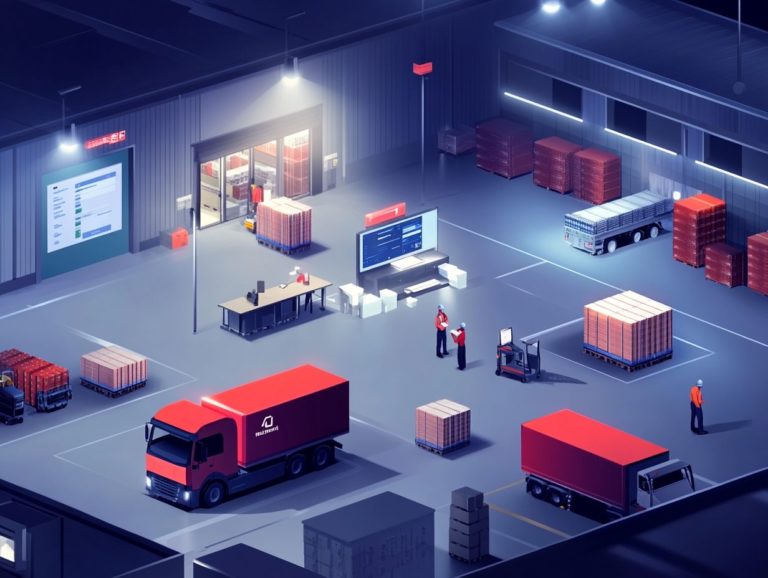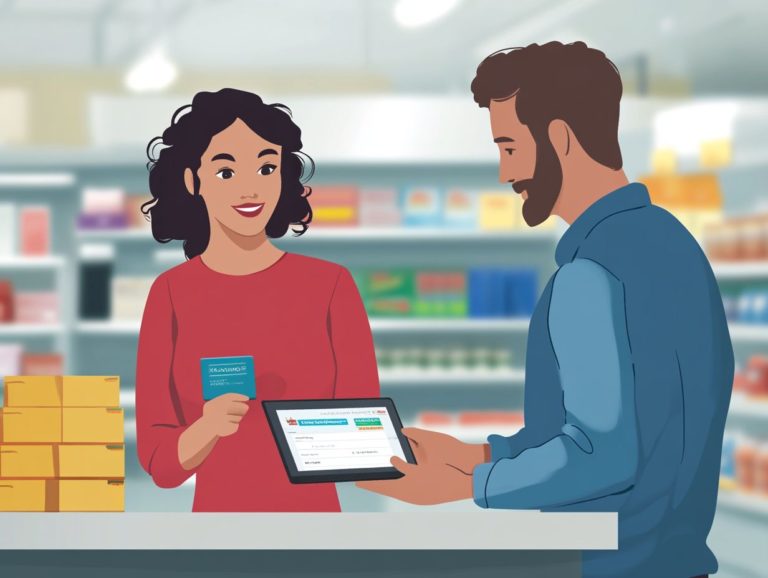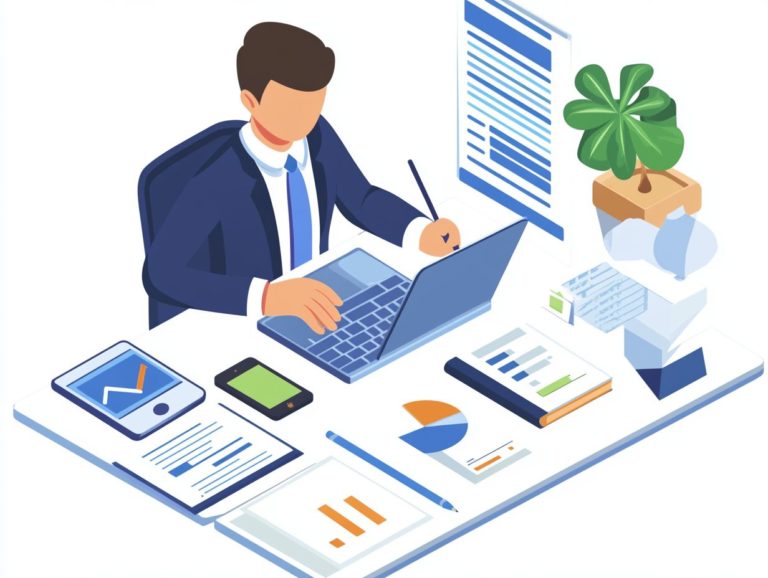55. 5 Must-Have CRM Features for Nonprofits
In the fast-paced realm of nonprofit work, mastering donor management and engagement is essential for your organization s success. Selecting the ideal Customer Relationship Management (CRM) system can significantly streamline your operations while enhancing your relationships with donors.
This article delves into five critical CRM features specifically designed for nonprofits, such as:
- Customization options
- Integration capabilities with fundraising software
- Powerful reporting tools
You ll also find insights on how to choose the right CRM for your organization, along with a breakdown of costs, potential challenges, and effective strategies for successful implementation.
Dive into these insights to discover how the right CRM can supercharge your nonprofit’s impact!
Contents
Key Takeaways:

Customization options in a CRM will help nonprofit organizations effectively manage donors and tailor their outreach efforts, especially when considering key CRM features for startups.
Integration with fundraising software allows for seamless donation tracking and increased donation conversions.
Volunteer management tools in a CRM empower nonprofits to efficiently organize and coordinate volunteer efforts.
1. Customization Options for Donor Management
Customization options in donor management systems are essential for nonprofit organizations aiming to enhance their fundraising processes. This flexibility allows you to tailor features, user interfaces, and functionalities to suit your unique needs and preferences.
As a result, you can achieve improved donor engagement and more insightful data analysis. For example, the ability to configure specific donor data fields enables you to capture relevant information that aligns with your mission and goals.
This fosters a deeper connection with your supporter base. A user-friendly interface ensures that your team can navigate the system effortlessly.
This allows them to manage relationships effectively without the burden of extensive training. Integration capabilities with other software tools streamline workflows and reduce the need for manual data entry.
With automation tools at your disposal, you can simplify communication by scheduling emails or reminders. This ensures that your donors feel appreciated and well-informed, enhancing the entire relationship management process.
2. Integration with Fundraising Software
Effective integration with fundraising software is essential for your nonprofit organization. It enables seamless donation tracking and online giving capabilities, along with detailed performance measures that elevate your overall donor management strategies.
By leveraging platforms like Bloomerang, Salesforce, and Blackbaud, you can create a cohesive approach to managing your fundraising efforts.
When you integrate Bloomerang with a crowdfunding platform, all donor data and transaction histories synchronize seamlessly. This allows for more accurate reporting and analytics.
Salesforce s robust data management capabilities streamline tracking donor engagement, offering you valuable insights into giving patterns. This integration enhances your reporting tools and enables informed decision-making.
With Blackbaud s solutions, organizations like yours successfully utilize integration to enhance communication efforts and track campaign success, ultimately leading to increased funding and community support.
3. Volunteer Management Tools
Volunteer management tools are essential for nonprofit organizations. They help you streamline engagement efforts, facilitate training, and nurture relationships among your volunteers and staff.
These innovative tools come packed with features that significantly enhance the volunteer experience.
- The scheduling functionality allows you to assign shifts and manage availability effortlessly. This ensures that volunteers are placed in roles that align with their skills and interests.
- Tracking hours provides you with valuable insights into volunteer contributions, enabling you to recognize their efforts and maintain accurate records for reporting purposes.
- Effective communication tools bridge the gap between volunteers and coordinators, fostering a sense of community and commitment.
When these tools are integrated with Customer Relationship Management (CRM) systems, they enhance data management. This allows you to tailor your outreach and improve engagement, leading to increased volunteer retention and satisfaction.
Now is the time to evaluate your current CRM or explore new options that align with your organization s goals!
4. Event Management Capabilities
Event management capabilities are essential for nonprofit organizations. They equip you with the necessary tools to plan, execute, and analyze fundraising events with precision.
This not only enhances donor engagement but also elevates communication efforts.
By making use of features like registration tracking, you can effortlessly monitor attendee sign-ups. This allows you to tailor your outreach strategies accordingly.
This valuable data sheds light on potential donor interest and enables personalized communication. As a result, every attendee feels valued and informed throughout the entire process.
Utilizing tools that facilitate attendee communication strengthens relationships. It streamlines interactions before, during, and after events.
Post-event analytics provide critical insights into your fundraising success. You can assess the effectiveness of your initiatives and make informed, data-driven decisions for future events.
Together, these features form a robust framework that enhances overall engagement. This ultimately fosters stronger donor relationships and secures long-term support.
5. Reporting and Analytics Features

Robust reporting and analytics features in donor management systems enable you to glean invaluable insights about your donors. This supports data-driven decisions through comprehensive metrics and effective data analysis.
By using these sophisticated tools, you can uncover trends that highlight donor preferences and giving patterns. This helps you identify areas that may need more attention.
This profound understanding sharpens your outreach strategies and strengthens your relationships with supporters. It fosters more personalized communication.
Leveraging these insights allows you to evaluate the effectiveness of your fundraising campaigns. You can pinpoint opportunities for enhancement.
The capacity to measure impact through detailed reports helps you demonstrate your value to stakeholders. This secures ongoing support that ultimately drives greater success in your mission-driven endeavors.
How Can a CRM Benefit Nonprofit Organizations?
A Customer Relationship Management (CRM) system can be a game-changer for nonprofit organizations. It streamlines your donor management processes while enhancing relationship management.
Customizable features integrate seamlessly with other fundraising software. The result? Improved operational efficiency and a greater likelihood of achieving your fundraising goals!
By utilizing automation tools within a CRM, you can establish personalized communication. This nurtures your donor relationships over time, ensuring your supporters feel valued and engaged.
For instance, integrating your CRM with email marketing platforms allows you to send automated thank-you messages or regular updates. This fosters transparency and trust in your interactions.
Many organizations have experienced substantial increases in donations and donor retention rates after implementing these systems. One nonprofit even reported a 30% increase in recurring donations within just six months of adopting a tailored CRM solution!
This showcases the technology’s potential and underscores its significant contributions to fundraising success and deeper connections with your donors.
What Are the Key Features to Look for in a Nonprofit CRM?
When evaluating a nonprofit CRM, it’s crucial to consider key features like customization options and integration capabilities. To ensure success, you should also look into essential CRM practices for nonprofits, as user-friendly interfaces and robust reporting tools are also essential.
These elements work together to enhance donor management and engagement. They streamline daily operations and enable you to analyze your donor base more effectively.
Customization options allow you to adapt the software to fit your unique fundraising campaigns. This can be a game-changer!
Integration capabilities, like those offered by popular platforms such as Bloomerang and Salesforce, enable seamless connections with your existing tools. This simplifies tasks like donation tracking and event management.
A user-friendly interface means even your non-technical staff can navigate the system effortlessly. This cuts down on training time.
Advanced reporting tools provide valuable insights into donor behaviors and campaign effectiveness. This supports knowledge-based decision-making and ultimately boosts your overall fundraising success.
Discover how our CRM can transform your organization today!
How Can a Nonprofit Organization Choose the Right CRM for Their Needs?
Choosing the right CRM for your nonprofit organization requires a thoughtful evaluation of your specific needs. Consider factors such as customization options, integration with your existing systems, and the total costs associated with implementation and training. Additionally, look for key features of CRM for event management to ensure it meets your objectives.
To kick off this process, start by conducting a thorough review of your current systems. Pinpoint their strengths and weaknesses while keeping your long-term goals in mind. It s essential to identify which features will enhance your operational efficiency and how these align with your mission.
Engaging in trial periods with potential CRMs can provide invaluable insights into how well they fit into your daily operations. User feedback during these trials is crucial, offering real-world perspectives that can help steer your final decision.
This way, you can ensure the chosen system truly meets the unique demands of your nonprofit’s structure and objectives.
Understanding CRM Costs
The costs associated with implementing a nonprofit CRM can vary significantly. These costs encompass factors such as subscription fees for cloud-based systems, potential expenses for on-premises solutions, and costs related to staff training and ongoing support.
Understanding these diverse expenses is essential as you assess your nonprofit’s budgetary constraints. Initial setup costs may involve not just software purchases but also hardware investments if you choose an on-premises solution.
Ongoing maintenance costs should include subscription renewals, regular updates, and the potential need for technical support. Training your staff to use the CRM effectively requires extra resources, both financial and temporal, impacting your overall budget significantly.
By thoroughly evaluating these components, you can make informed decisions that align your CRM capabilities with your fiscal responsibilities.
What Are the Potential Challenges of Using a Nonprofit CRM?

While nonprofit CRMs bring many advantages, you might encounter some challenges. These include the necessity for technical skills among your staff and the complexities of integrating with existing systems. Additionally, understanding essential CRM features for real estate can help navigate these hurdles more effectively.
Effectively managing automation features can also pose difficulties. These obstacles can impede the optimal use of CRM systems, making it tough for your team to fully leverage their functionality.
It’s not uncommon for staff to feel overwhelmed by the technology, which can lead to resistance in adoption. Integrating a new CRM with other tools, like fundraising or email marketing platforms, can also pose significant technical hurdles.
To tackle these issues, consider investing in comprehensive training programs to ensure that everyone feels at ease with the system. Look for CRMs that offer seamless integration options and prioritize clear communication throughout the implementation process.
This approach can significantly enhance user experience and overall satisfaction within your organization.
How Can a Nonprofit Organization Successfully Implement a CRM?
Successfully implementing a CRM in your nonprofit organization requires a well-structured approach. This includes thorough training for your staff, careful customization of the system to meet your unique needs, and strategies for effective CRM to foster engagement among stakeholders throughout the transition process.
This journey can transform your nonprofit’s effectiveness! Engaging your team from the start ensures that every voice shapes the system to your needs.
Once everything is set up, a robust training program ensures that each user feels confident navigating the new tools, which ultimately leads to higher adoption rates.
Providing ongoing support is essential to address any challenges that may arise. Encouraging collaboration among development partners can facilitate knowledge sharing and help elevate best practices within your organization.
Frequently Asked Questions
What is a CRM?
A CRM (Customer Relationship Management) is a technology and strategy used by organizations to manage and analyze interactions with potential and current customers. It helps to streamline processes and improve relationships with customers.
Why is a CRM important for nonprofits?

A CRM can help nonprofits understand and engage with donors, volunteers, and other people involved. For those looking to enhance their efforts, exploring the top 5 CRMs for nonprofit fundraising can boost fundraising, event management, and communication.
What are the top 5 must-have CRM features for nonprofits?
The top 5 must-have CRM features are donor management, volunteer management, event management, email marketing, and reporting. These key features every nonprofit CRM should have help nonprofits effectively connect with their supporters.
What is donor management and why is it important?
Donor management lets nonprofits track all interactions with their donors. This includes donation history and personal preferences, helping to build strong relationships.
Can a CRM help with fundraising efforts?
A CRM can significantly enhance fundraising for nonprofits. Features like donation tracking and personalized outreach are essential, and you can find the 5 best CRMs for nonprofits that help increase donations.
Is it necessary for a nonprofit to invest in a CRM?
Not all nonprofits need a CRM, but it can be a game changer for those that do. For example, automotive dealers can benefit from understanding the must-have CRM features that improve efficiency, communication, and donor management, streamlining processes and strengthening relationships.






